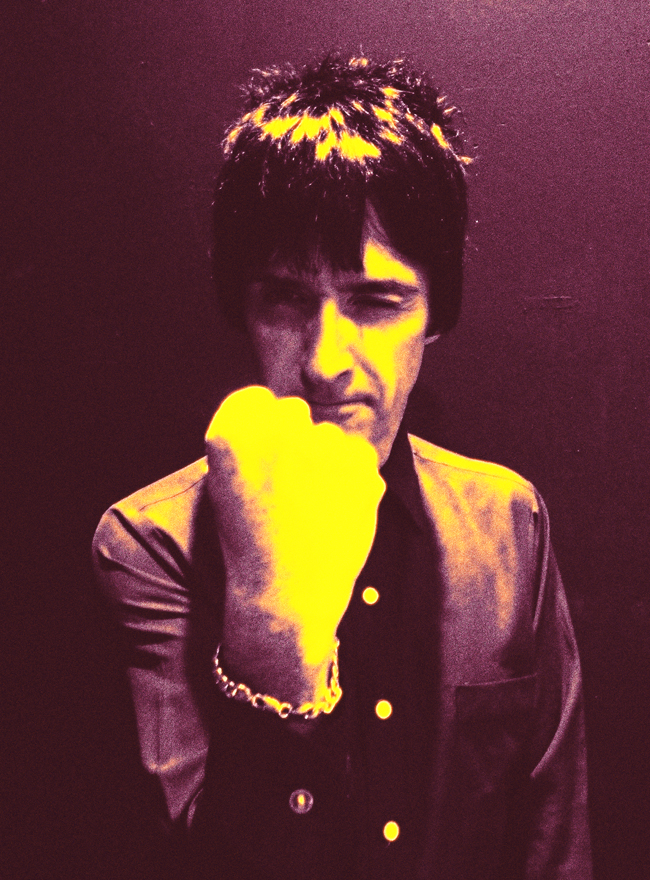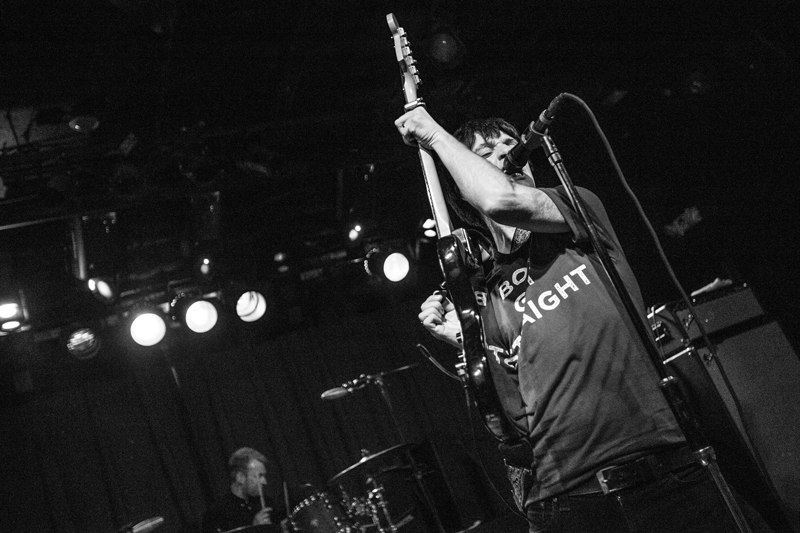
A Johnny Marr Fanzine
"No Rockism"
"No rock, no rockism, no rockism at all...
No rockism in your guitar playing, no rockism in your clothes, no rockism in your behaviour or your lyrics or your politics.
It was a really good thing."
– Johnny Marr
No rockism in your guitar playing, no rockism in your clothes, no rockism in your behaviour or your lyrics or your politics.
It was a really good thing."
– Johnny Marr
Johnny's above quote from a Noisey interview with John Doran a couple of years ago speaks of his influences during the post-punk wave a little before his ascent into the social conscience. To the non-fan, the philistine who views Johnny as the figure who only brought the melodic and emotional "Rickenbacker jangle" to alternative rock is sadly mistaken. The Ardwick axe-man was and still is heavily inspired by proto-punk, punk and the New York/new wave sounds of the late '70s and early '80s.

Johnny as an aspiring youth looked to the likes of anti-everythings The Velvet Underground as he began his quest into musical greatness playing in Velvets-inspired Manchester band Sister Ray in his mid-teens for a one-off gig. Years later Johnny would state that certain songs from The Smiths were Velvet Underground-influenced, including "The Queen Is Dead", where certain screechy intervals in the track were influenced by the song "I Can't Stand It".
Johnny also constantly proclaims his admiration for Iggy and the Stooges' guitarist James Williamson in Raw Power - "It kind of struck me that he had the attitude of Keith Richards but the technicality of Jimmy Page, and Raw Power to me has never been bettered in terms of rock guitar." This isn't melodic, "jangly" music; it's thick, dense rock which Marr was exposing himself to.
"Johnny's forty-five second intro was hard rock but with a pop sensibility and was what Joni Mitchell "would have done had she been an MC5 fan or a punk rocker."
I remember vividly the first time I laid my virgin ears on The Smiths, in a flat in the US miles away from my Irish home where, on the Internet, I randomly (and luckily) clicked on the "The Headmaster Ritual", having been drawn in by the Meat Is Murder album artwork. It was like nothing I'd ever heard before: I was hooked. Johnny's forty-five second intro was hard rock but with a pop sensibility and was what Joni Mitchell "would have done had she been an MC5 fan or a punk rocker." Johnny once again showcasing his pre-punk influences mixed with his love of softer folk sounds. The track had that rock base, but with a punk purpose elevated by Morrissey's anti- corporal punishment lyrics.
Though all of this talk of punk is intriguing, you may ask yourself why has Johnny never been involved in or produced a "pure punk" song? Just before The Smiths began, Marr loathed what the rock world was producing: hairspray, spandex, macho-guitarism. Van Halen, Bon Jovi and Aerosmith were among the glam metalists that viewed the guitar as a symbol of manhood and showboating. Smiths photographer Kevin Cummins said that "Music was going in a very different direction and The Smiths brought it back to a very basic level, and it was a level that everyone could understand." This was mostly down to Johnny's guitar and the wave of music that allowed him to do this - post-punk and no "rockism". Showboating solos, distortion and even rock fashion were out the the mercurial Mancunian could perform ear-catching, arpeggio rock tracks but with a stripped- back attitude, abstaining from undermining his listeners while still educating: rock, but anti-rock. Johnny obtained solace through the likes of Magazine and Television. The latter's vocalists/guitarists Tom Verlaine and Richard Lloyd had a huge bearing on Johnny's sound, and are bands he was extremely fond of in his teens and still to this day. Even now he still cites post-punk and new wave as very important to his ideologies and his playing; case in point being his official debut solo record The Messenger, which he says is a "12 track record that I think sounds like Blondie."

Photo by Ben Stas
Away from music, our axe-man approaches his lifestyle with the hardcore punk philosophy of "straight edge" - veganism, teetotalism and abstinence from tobacco and drugs are the orders of the day. He's been with the same girl, Angie, since before The Smiths formed and has two kids; son Nile (named after his hero Nile Rodgers) and daughter Sonny. This is not your typical rock star. "Ultimately, one of the things about my lifestyle is that I live like in a way that is whatever is going to be best for me to be super, super, super creative." The term "straight edge", coined by forerunners in hardcore punk Minor Threat, was clearly an influence on Johnny. Vocalist/ guitarist in other influential rock bands including Fugazi, Ian MacKaye is one of Marr's favourite guitarists.
It always irritates me when people say The Smiths were just a sappy, bleak outfit. Sometimes they were (in a positive way) but most of the songs carried punk ideals and some even a punk sound - the aforementioned "The Queen Is Dead", "London", "Sweet and Tender Hooligan" and the unreleased "Heavy Track" instrumental demo spring to mind right off. Meat Is Murder and The Queen Is Dead are, in terms of making a statement, as punk as music has ever gotten, revolving around anti-corporal punishment, vegetarianism, anti-corporate music, religion and politics. "Panic" is a glam rock beat derived from T. Rex's "Metal Guru", another major influence on the formation and origin of punk as well as Johnny's sound. "Panic" chastised the music industry and DJs for not playing The Smiths' music on the radio.
Meat Is Murder and The Queen Is Dead are, in terms of making a statement, as punk as music has ever gotten, revolving around anti-corporal punishment, vegetarianism, anti- corporate music, religion and politics.
Even after The Smiths' demise Johnny continued with his new wave and post-punk roots when playing with the likes of the Pretenders and Talking Heads. Even to this day, with his latest solo effort Playland, there is a distinct synth and new wave sound throughout the album, particularly with the opener "Back in the Box", "Speak Out Reach Out" and "This Tension". The man has a great knack for taking music he knows from his youth, modernising it and making it his own. You know a Marr sound when you hear it. The first time I laid eyes on Johnny in the flesh was at Leopardstown Racecourse, Dublin in August of last year and in amongst the live set was a punk classic - "I Fought the Law", originally a rock and roll number by The Crickets, but brought to the masses by punk legends The Clash. The frontman blasted into the rip-roaring crowd-pleaser which sounded like it belonged on a punk album from the 1970s - a statement I'm sure the late Joe Strummer would have no qualms in agreeing with. Punk is everywhere with Johnny. It's punk the Marr way.
